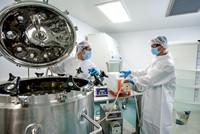Advertisement
Grab your lab coat. Let's get started
Welcome!
Welcome!
Create an account below to get 6 C&EN articles per month, receive newsletters and more - all free.
It seems this is your first time logging in online. Please enter the following information to continue.
As an ACS member you automatically get access to this site. All we need is few more details to create your reading experience.
Not you? Sign in with a different account.
Not you? Sign in with a different account.
ERROR 1
ERROR 1
ERROR 2
ERROR 2
ERROR 2
ERROR 2
ERROR 2
Password and Confirm password must match.
If you have an ACS member number, please enter it here so we can link this account to your membership. (optional)
ERROR 2
ACS values your privacy. By submitting your information, you are gaining access to C&EN and subscribing to our weekly newsletter. We use the information you provide to make your reading experience better, and we will never sell your data to third party members.
Start-ups
BioNTech raises $325 million to power mRNA immunotherapies and more
The German firm is also ramping up its antibody, cell therapy, and small-molecule drug development efforts
by Ryan Cross
July 9, 2019

BioNTech, a German drug company that’s developing individualized therapies for cancer, has raised $325 million in series B financing from a large group of private investors. It’s a lot of money, but investors see an ambitious company with a diverse pipeline of promising drugs.
BioNTech is best known for its experimental messenger RNA therapy programs and as a competitor to firms like Curevac and Moderna, which are wholly focused on mRNA.
In the human body, all proteins are made from a set of mRNA instructions, and several biotech firms are trying to harness the power of those molecular instructions to help the body make its own therapeutic proteins. The idea is simple in theory, but tough to perfect, and companies have invested enormous sums in research and manufacturing to make mRNA therapy a reality.
Moderna, BioNTech’s US-based competitor, raised more than $2.6 billion from collaborators and private investors before collecting $600 million during its stock market launch in December 2018. And BioNTech has been on a fundraising kick itself. Last year it reeled in a $270 million series A. It’s also struck partnerships with Pfizer and Sanofi that together yielded the firm about $210 million in the past year.
Yet unlike its competitors, which are wholly focused on mRNA, BioNTech is also developing a diverse armamentarium of drugs for cancer, including antibodies, cell therapies, and small molecules. It’s a lot for one company to juggle, but Chief Business Officer Sean Marett insists that the breadth is all about matching the right approach to the right drug target.
“We start at the target. Then we find the right technology to make a therapeutic for that target,” he says. “And if you do it that way, you are somewhat agnostic to the technology you use.”
Sometimes there’s more than one way the company could make a drug. For instance, BioNTech is partnering with the biotech firm Genmab to develop bispecific checkpoint inhibitors, which are antibodies that bind two targets, unleashing the immune system’s ability to attack cancer. “But theoretically there is no reason that you can’t use an mRNA” to encode the antibodies, Marett says.
And the approaches may be complementary. Earlier this year BioNTech acquired the antibody generation unit of MAB Discovery. That means BioNTech can still use traditional methods to discover therapeutic antibodies but can then encode them in a strand of mRNA, which will be the drug that is ultimately injected into humans.
BioNTech plans on combining multiple modalities into one therapy as well, Marett says. For instance, the company is developing T-cell therapies for solid tumors, including ovarian and pancreatic cancers. Solid tumors are hard to treat with cell therapies because the tumors release molecules that suppress the immune system and confuse T cells. BioNTech plans on using mRNA vaccines to flare up those tumors and help direct the T cells toward them.
Manufacturing has been a significant hurdle for companies developing cell therapies, and Marett says his company plans to use part of its new financing to continue building up its manufacturing capacities for both cell therapies and mRNA.
Despite BioNTech’s immunotherapy focus, the company has three partnerships that could extend its mRNA technology beyond cancer. One of them is with Genevant Sciences to develop five rare disease mRNA therapies in which the mRNA will encode proteins that are missing or dysfunctional. Pfizer is also partnering with BioNTech to develop mRNA-based flu vaccines.
Developing this diverse array of drugs will require deep pockets. BioNTech has 7 programs in the clinic now, with more on their way. “That’s a key driver” of the new financing, Marett says. “And we are really pleased with it because it allows us to continue to aggressively grow the company.”



Join the conversation
Contact the reporter
Submit a Letter to the Editor for publication
Engage with us on Twitter